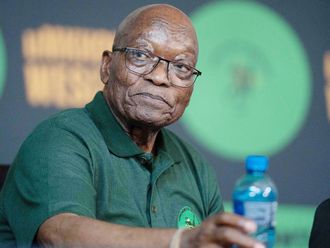Johannesburg: South Africa’s political impasse deepened on Saturday with no resolution to extended talks over President Jacob Zuma’s expected departure from office after his own party called for him to resign.
Cyril Ramaphosa, the president-in-waiting, and the ruling ANC party have said negotiations should be concluded within days, but have given no details about how Zuma will be eased out of power.
The stalemate has left South Africa’s political scene in limbo, with a series of public events cancelled this week including the flagship State of the Nation address to parliament in Cape Town on Thursday.
Zuma cleared his diary of weekend engagements, but deputy president Ramaphosa is due to speak at a rally in the city on Sunday to start a year of celebrations marking 100 years since Nelson Mandela’s birth.
February 11 also marks the day that Mandela was released from jail in 1990 — a key date in modern South Africa’s rebirth as apartheid white-minority rule crumbled.
Timeline of Jacob Zuma’s downfall
South African President Jacob Zuma is under pressure to resign over corruption allegations
1999: Zuma named South Africa’s deputy president
2005: Becomes embroiled in controversy over 1999 deal to buy European military equipment. Zuma implicated in corruption allegations and loses his job, although he denies charges
2009: During his campaign for presidency, prosecutors drop all charges against Zuma
2017: South Africa’s Supreme Court of Appeal reinstates charges against Zuma over 1999 arms deal
Feb 2018: South Africa’s Deputy President Cyril Ramaphosa announces that he is holding direct talks with Zuma to discuss transfer of power
Zuma and Ramaphosa will “conclude” discussions on Zuma’s exit within 48 hours and the outcome will then be announced to the nation, the News24 website said on Saturday without naming its sources.
But Susan Booysen, a politics professor from Wits University in Johannesburg, said Zuma may fight on for several more days.
“A stalemate is the best description for the situation,” she told AFP.
“Zuma is a fighter to the end and is refusing to resign, while Ramaphosa doesn’t want to be divisive.
“Zuma pretended to open the doors of negotiations, but he is digging in.”
Local media reported that a key sticking point in talks was over legal fees faced by Zuma, who is set for prolonged court battles related to multiple criminal cases.
On Friday, the president reportedly flew back from Cape Town to his official residence in Pretoria.
The ANC has said it is awaiting the “imminent conclusion” of the talks, and said the budget on February 21 will not be delayed.
Ramaphosa has made no official comment since Wednesday when he described the discussions as “constructive” towards securing “a speedy resolution of the matter.”
Zuma has made no comment since being asked to resign by senior ANC officials last Sunday.
The pro-Zuma New Age newspaper reported on Friday that the president would gather his family at his residence in Pretoria this weekend to inform them of his decision.
Zuma’s wife Thobeka Madiba-Zuma posted a picture of the couple on Instagram on Friday, adding a defiant comment that warned against “picking a fight with someone who is not fighting you”.
Zuma, 75, who has been in office since 2009, has clung to power despite a string of corruption scandals, an economic slowdown and record unemployment.
His hold on the ANC was shaken when his chosen successor — his former wife Nkosazana Dlamini-Zuma — narrowly lost out to Ramaphosa in a closely-fought race to be party leader in December.
Zuma faces several court cases, including action relating to 783 payments he allegedly received linked to an arms deal before he came to power.
Many of the recent graft allegations are linked to the Guptas, a wealthy Indian business family accused of improperly winning government contracts and influencing cabinet appointments.
In 2007, the party pushed out then-president Thabo Mbeki over allegations of abuse of power.
Under Zuma, the ANC suffered its worst electoral setback since coming to power in 1994, winning less than 54 per cent of the vote in municipal elections in 2016.
The Nelson Mandela Foundation, which promotes the legacy of South Africa’s anti-apartheid icon, has called for Zuma to go as he had “demonstrated that he is not fit to govern”.
Ramaphosa, 65, is a former trade unionist who led talks to end apartheid rule in the early 1990s and then became a multi-millionaire businessman before returning to politics.












